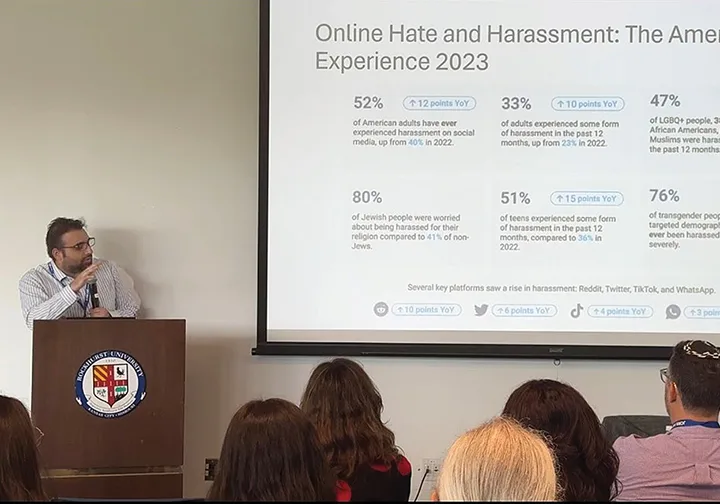
by Therese Horvat
Special to The Leaven
Identified as the first-ever summit in the Kansas City region to address combating antisemitism, a recent daylong symposium focused on education and action to “drive out the darkness” perpetrated by this age-old prejudice against people who are Jewish.
Among recurring themes at the April 16 event was the belief that antisemitism is not a Jewish issue.
“It is an American issue that threatens the values of democracy and pluralism,” explained Gavriela Geller, executive director of the Jewish Community Relations Bureau|American Jewish Committee Kansas City (JCRB|AJC), the agency that hosted the symposium.
Results of AJC’s annual State of Antisemitism in America Report released in February align with this perspective. Holly Huffnagle, U.S. director of combating antisemitism, AJC, noted that based on surveys conducted in fall 2023, 93% of American Jews think antisemitism is a problem today compared with 74% of the general public.
However, 95% of the Jewish U.S. population and 92% of the general public agree that antisemitism affects society as a whole and that everyone is responsible for combating it.
Ted Deutch, CEO, AJC on the national level, put it simply.
“When we [Jews] are at risk,” he said, “the country is at risk.”
Held at Rockhurst University in Kansas City, Missouri, the summit to combat antisemitism drew approximately 400 participants from the Jewish community and the broader population. Opening, closing and breakout sessions featured national and local thought leaders and content experts.
Antisemitism on the rise
Another theme throughout the symposium was that antisemitism has increased at alarming rates, particularly since the Oct. 7, 2023, attack on Israel by Hamas, considered the deadliest attack against Jews since the Holocaust. The detainment of Israeli hostages, the ensuing war and subsequent protests have heightened antisemitism.
According to the national survey, 63% of American Jews say the status of Jews in the U.S. is less secure compared to one year ago. Forty-six percent have changed behaviors out of fear of antisemitism, for example, avoiding wearing the Star of David Jewish symbol or attending Jewish events.

Geller said that the Kansas City region is not immune to this “explosion of antisemitism.” Since the October Hamas attack on Israel, JCRB|AJC Kansas City has seen a 500% increase in reports of antisemitic incidents in Kansas and western Missouri, including in local institutions of higher education.
“We must ensure that the terrible rise in antisemitism is not the story,” Geller urged, “but rather how we rose up to combat it, how we drove out the darkness.”
Oren Jacobson, executive director of Project Shema, a training and support organization, said it’s important to recognize Jews not only as a religious group, but as a people and a nation. He identified three undercurrents of antisemitism, including the use of antisemitism by people who seek power; the belief that Jews, Zionism and Israel are inherently evil; and the idea that Jews cannot be trusted.
“Jews and antisemitism have been used throughout history as a tool in fights for power. This is a problem and a trap,” Jacobson said.
Speaking from his experience as mayor when the Unite the Right rally occurred in Charlottesville, Virginia, in August 2017, Mike Signer witnessed the “great replacement theory” in action. In this context, the theory incited far right organizations who believed the Jews were trying to replace them and thereby make America unsafe for white nationals. Signer, a Jew, author and attorney, said the rally and events surrounding it shone a light on antisemitism and spawned conspiracy theories. He believes that getting people and organizations to make choices and take actions against antisemitism are strategies that provide strength and support.
Also stoking antisemitism is the proliferation of information that is either mistakenly reported (misinformation) or intentionally dishonest (disinformation). Representing organizations that work to combat hate speech and encourage civility, panelists in a breakout session encouraged people of all ages to develop media literacy to help distinguish between accurate and fake information available across the wide range of news sources.
Panelists expressed heightened concern about the advent of artificial intelligence. They cited the need for technology guardrails to protect consumers from information shared for profit-driven motives and not aligned with the common good.
‘Whole-of-society’ approach to change
Seeking to surmount the challenges of incivility, conspiracy theories and distrust that feed antisemitism, symposium speakers advocated for meaningful and supportive allyships, conscious choices to engage differently and personal conversations that allow for empathy and understanding. They proposed a “whole-of-society” approach in which Jews and others work together, form coalitions and build bridges.
Douglas Emhoff, Second Gentleman of the United States, discussed the rollout of the U.S. National Strategy to Counter Antisemitism. Released in May 2003, the plan has over 100 discrete calls to action organized around four pillars: increased awareness and understanding of antisemitism, including its threat to America; improved safety and security for Jewish communities; reversal of the normalization of antisemitism and countering antisemitic discrimination; and development of solidarity and coalitions.

Over lunch at the symposium, participants reviewed actions of the national plan and brainstormed opportunities to combat antisemitism in the Kansas City region. Feedback will help inform development of the first plan to counter and dispel antisemitism in the Heartland.
Close to heart and home, the symposium occurred three days after the 10th anniversary of the deadly attack targeted toward Jews at two sites in Overland Park. Three persons — none of whom were Jewish — died. In the aftermath, Mindy Corporon, whose son and father were among the victims, committed to turning tragedy to hope with the founding of SevenDays. This initiative promotes kindness and understanding year-round and in a weeklong annual observance.
In her opening remarks at the symposium, Corporon explained that she felt the responsibility to let people know that “hate does not discriminate; neither does kindness. Bad things happen,” she said. “We have to collectively come together to say we are going to do something good and make a ripple to change the world.”
Wrapping up the symposium, Geller added urgency to this message.
“We stand against antisemitism, extremism and hatred of any kind,” he said. “We are standing for pluralism, democracy and keeping all people safe, free and equal.”
Youth take leadership role in combating hate
by Moira Cullings
moira.cullings@theleaven.org
Three archdiocesan high school students are combating hatred with kindness through their role on the SevenDays Kindness Youth Leadership Team (KYLT).
Team members of various ages and backgrounds meet monthly during the school year to plan events and activities for SevenDays and help run those events.
Lola Kernell, a senior at Bishop Miege High School in Roeland Park, was eager to get involved.
“I joined KYLT for two reasons,” she said. “One, because I’m all about peace and promoting kindness, and two, because I want to advocate for other people like me with diverse abilities.”
Kernell was asked to be on the team to represent the Down syndrome community, and she describes it as “an amazing experience.”
“KYLT has taught me to look for opportunities to be kind to people — even those whom I haven’t interacted with — [and] just be there for someone who wants people to listen, and embrace our differences,” she said.
Erica Strathman, a sophomore at St. Thomas Aquinas High School in Overland Park, joined KYLT as a way to make a difference.
“Involvement in this project has taught me a better understanding of other people,” she said, “and how to make an impact — no matter how small — in my community.
“I have learned how my actions can affect others and how to have a better approach to kindness in my everyday life.”
Caroline Plumb, a senior at Aquinas, said KYLT “has given me a better understanding of where hatred comes from and how to properly combat it with kindness.”
Her experience with the group has taught her how connected people are, despite how it might seem on the surface.
“We are a group of students, of many different religions and backgrounds, who see love as something that should be freely given,” said Plumb.
“Even a small action can make a ripple of kindness that can reach others,” she added. “When people come together, you can see a common love for each other.”






